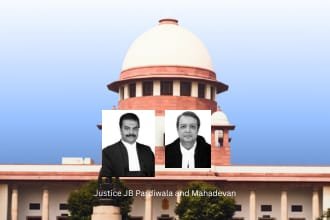In a significant judgment reinforcing the rights and dignity of elderly citizens, the Supreme Court of India upheld an eviction order passed under the Maintenance and Welfare of Parents and Senior Citizens Act, 2007. The Court restored the decision of the Maintenance Tribunal, directing the eviction of a son and daughter-in-law from the self-acquired property of a 75-year-old man. The ruling is a crucial precedent emphasizing the legislative intent behind the Senior Citizens Act—to provide effective protection of life and property of senior citizens.
Background of the Case
The case arose from a dispute between a retired employee of the Bihar State Housing Board, Rajeswar Prasad Roy, and his third son and daughter-in-law. The appellant had constructed a Rest House with 20 rooms on a leasehold property in Kankarbagh, Patna, post-retirement. While he and his wife lived elsewhere, his son (Respondent No.8) and daughter-in-law (Respondent No.9) allegedly encroached on multiple rooms of the Rest House.
What began as a temporary arrangement soon escalated into a serious conflict. The daughter-in-law allegedly caused familial discord and later, along with her husband, threatened the appellant with false criminal cases. As matters worsened, the elderly father approached the Maintenance Tribunal under the 2007 Act, seeking eviction of the encroachers.
Maintenance Tribunal and High Court Rulings
The Maintenance Tribunal ruled in favor of the appellant, holding that he was entitled to seek viction of his son and daughter-in-law, who had no legal rights over the self-acquired property. The High Court Single Bench upheld the order, emphasizing that the Senior Citizens Act provides a simple and quick mechanism to protect elderly persons from mental and physical harassment.
However, the Division Bench of the High Court set aside the order, stating that without a specific claim of maintenance under Section 23(1) of the Act, eviction could not be granted. The bench opined that imposing a fair rental obligation on the son and daughter-in-law would suffice, and referred the matter back for reassessment of rent.
Supreme Court’s Observations and Verdict
The Supreme Court Bench of Justices Vikram Nath and Sandeep Mehta reversed the Division Bench’s decision, restoring the Maintenance Tribunal’s order. The Court noted several crucial facts:
- The property in question was self-acquired, not ancestral, giving full ownership rights to the appellant.
- The son and daughter-in-law encroached upon the property and subjected the appellant to harassment, including false criminal threats.
- There was a clear intent to misuse legal provisions like the Domestic Violence Act, which Respondent No.9 invoked against the appellant and his family.
The Court referred to Rule 21(2)(i) of the Bihar Senior Citizens Rules, 2012, highlighting the District Magistrate’s duty to ensure the protection of life and property of senior citizens. It further relied on the precedent laid in S. Vanitha v. Deputy Commissioner, where the Tribunal’s authority to pass eviction orders under the Act was upheld.
According to the Court:
“It shall be a defeat of the purpose of the Act if the appellant is not granted the benefit of eviction… they have not only encroached his self-acquired property but also threatened him of false criminal complaints… causing mental and physical harassment to old parents.”
The Supreme Court set aside the Division Bench ruling and granted time till 31st May 2025 for Respondent Nos. 8 and 9 to vacate the premises and hand over peaceful possession to the appellant.
Legal Significance
This judgment is a powerful reaffirmation of the Maintenance and Welfare of Parents and Senior Citizens Act, 2007, which seeks to:
- Ensure elderly persons live with dignity and security.
- Provide them with legal remedies against harassment or neglect.
- Enable eviction of unauthorized occupants, especially if they are family members exploiting the elderly for property.
The ruling also clarifies that eviction need not be contingent upon a monetary maintenance claim. Instead, if the presence of family members in the property endangers the mental or physical well-being of the senior citizen, eviction can be a justified remedy under the Act.
Broader Impact on Similar Cases
This judgment will serve as a critical precedent in cases where elderly parents are subject to abuse or property encroachment by children or relatives. It reinforces that:
- Possession without legal right on a senior citizen’s property is not protected.
- Senior citizens can approach the Maintenance Tribunal for effective relief.
- Tribunals are empowered to grant eviction orders, especially when elderly people are being harassed or threatened.
Moreover, it reiterates that maintenance rights under the Act go beyond mere financial support—they encompass safety, dignity, and peaceful possession of property.
Conclusion
The Supreme Court’s judgment in Rajeswar Prasad Roy v. State of Bihar & Ors. marks a pivotal moment in the judicial enforcement of the Senior Citizens Act, 2007. It sends a strong message against domestic exploitation and reinforces the legal recourse available to aging parents. The verdict is a win not just for one man, but for every elderly citizen seeking justice, dignity, and a peaceful life in their twilight years.


